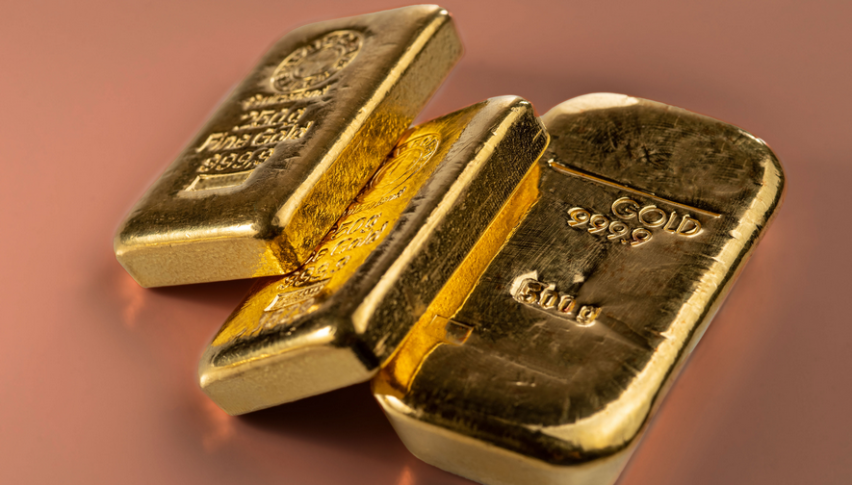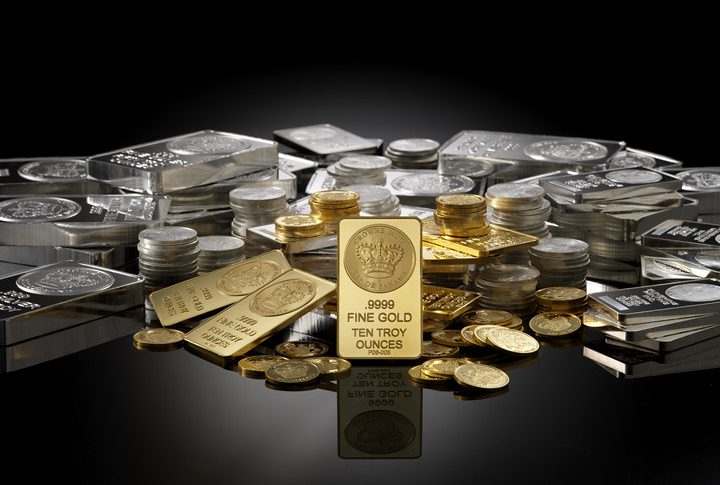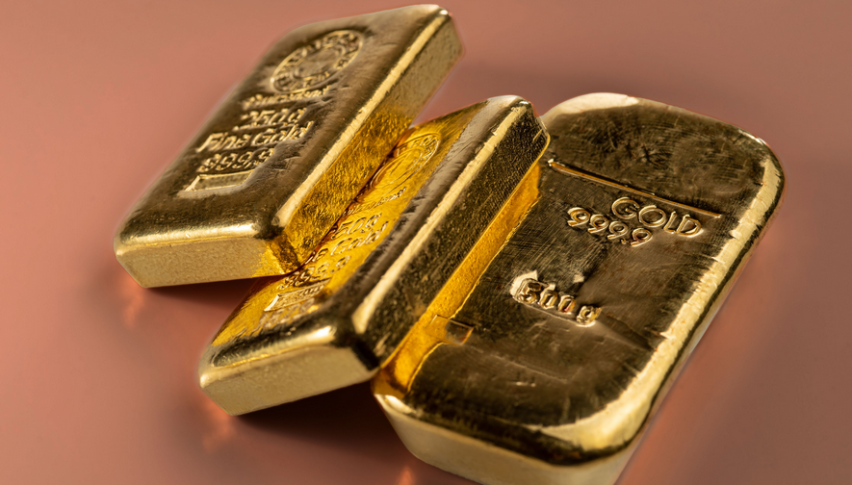Silver, like any other trading artifact, experienced a detrimental breakdown of the 2022 fallout. Back in 2021, Silver traded at $22.73 per ounce but by 2022 it had dropped up to $21.73 per ounce as reported by London Bullion Market Association (LBMA).
Silver prices are being dragged down by concerns about a recession and lower demand for industrial use. Despite underperforming gold, the decline is restrained due to expectations of limited supply. Analysts’ predictions offer insights into where the silver market may head next for investors to lead their trade. Therefore, silver is at its roots to recover the market.
Due to a change of taste by silver traders, silver is expected to trade at $24.59 by the end of the year 2023. Silver being a commodity that is stocked as assets by trade tycoons, high expectations of growth are lined to be experienced.
By the end of 2024, the prices of silver are expected to rise 34% from 4% the previous year. This will be a high escalation as it might be trading at $30.81 which will be an increase of $6.22 in one year. Therefore, by 20230 silver will have a good fortune.
Trade with silver against other metals like gold, iron, and tin will be exponentially appreciated by most users due to its efficiency in electronic appliances. Therefore, by the end of 2027, it is highly expected to trade at $44.72 which will be an increase of 90%. Comparing the drastic changes and high expectations of trade with silver, by mid-2030, silver is expected to trade at $62.73. This will have a positive impact which shows a good fortune for silver metal traders.
A strange phenomenon has been taking place in financial markets in recent weeks as retail traders and investors try a crusade against Wall Street; it started with retail traders and investors following a post on Reddit to buy GameStop shares which snowballed into a surge. Bitcoin also jumped around $ 8,000 higher after Elon Musk also posted on Reddit #Bitcoin towards the end of February. Silver was the latest asset to get a boost from the Reddit community of traders after a post on Reddit last week declared Silver “THE BIGGEST SHORT IN THE WORLD” and encouraged traders to pile into the iShares trust as a way to stick it to big banks. BlackRock Inc.’s iShares Silver Trust, the largest exchange-traded product tracking the metal, recorded an unprecedented $944 million net inflow on Friday.
The performance in safe-haven assets has been mixed during 2020. They started the year on a slightly bullish footing, due to tensions in the Middle East, but crashed lower in February and March, because of the initial panic after the coronavirus travelled to Europe. Safe havens resumed their bullish trend after the panic mode switched off, with Silver and Gold marching higher as the global economy went into a massive recession. Silver nearly tripled in value within the space of a few months, surging from above $ 10 to $ 30, while gold made some record highs, climbing above $ 2,000.
Recent Changes in the Silver Price
| Period | Change ($) | Change % |
| 6 Months | -2.845 | -12.05% |
| 1 Year | -5.26 | -22.31% |
| 3 Years | +9.15 | +38.80% |
| 5 Years | +4.73 | +21.07% |
| Since 2000 | +18.59 | +78.79% |
In our last long-term forecast, we left silver with a strong bullish momentum, although that momentum didn’t last long, and during the second week of August, we saw a bearish reversal in safe haven metals. Gold lost more than $ 300, falling below $ 2,000 again, where it has been trading ever since, while silver has been bouncing within a range, roughly between $ 22 and $ 30. So, silver has performed much better than gold during this time, with the gold/silver ratio, as shown in the chart further down, declining since the middle of March 2020. Overall, silver ended the year with decent gains, although 2021 might not be very bullish for it, as you will see from the analysis below.
As mentioned above, safe havens had a mixed year in 2020; although it might seem like they have gained in value, which they did in USD terms. However, this could be attributed to the pronounced weakness in the USD during this time. Even so, safe haven metals, like gold and silver, have been retreating lower since August, while the gains in the safe haven currencies have been much smaller than the decline in the USD, which shows that overall, safe havens have been stagnating since the middle of 2020.
The industrial demand for silver has increased, yet we haven’t seen any major bullish momentum. Even the December rally in gold and silver is over now, as the price turned bearish again in the first two weeks of January. The volatility has surely been quite high, with the price making some swings, which has offered some good trading opportunities, although the risk has been quite high as well. Now, for silver, the price is heading down again, and if the USD situation improves in 2021, which it should at some points, this might be a bearish year for silver and gold.
Upcoming Events to Affect Silver Price
Tuesday, 2 February, 2021  Q4 GDP QoQ Eurozone
Q4 GDP QoQ Eurozone
Wednesday, 3 February, 2021  January CPI Eurozone (YoY)
January CPI Eurozone (YoY)
Silver – Forecast Summary
| Silver Forecast: H1 2023 Price: $25 – $27 Price drivers: Market sentiment, COVID-19, Global economy, Politics | Silver Forecast: 1 Year Price: $26 – $29 Price drivers: Post COVID-19, Safe haven status, Less dovish central bank rhetoric? | Silver Forecast: 3 Years Price: $30 – $32 Price drivers: Global economy, Safe haven status, Market sentiment |
Silver – XAG/USD Price Prediction for the Next 5 Years
Silver was on a bearish trend for about a decade, after topping just below $ 50 in 2011, during the Eurozone debt crisis, which sent safe havens higher and commodities lower. It looked like the bullish trend might have resumed again after the surge in the first half of 2020, but there was no follow-through in the second half of last year, and 2021 has started off bearish for silver, which has retreated lower, losing nearly $ 4 so far. During these uncertain times, when the global economy seems to be changing, perhaps together with the political scene, gold and silver should have been extremely bullish, but the cryptocurrency market took on safe haven status in 2020, stealing the limelight from the traditional safe havens. Comments from the Bank of Japan governor Haruhiko Kuroda reinforced this in December. So, however you look at it, everything points to a further retreat in the coming months, particularly if the global economy starts to recover in spring.
Silver Losing its Safe Haven Status During the Coronavirus Crisis?
Precious metals like silver and gold used to be the ultimate safe havens, meaning they turn bullish when the sentiment in financial markets turns negative, as traders and investors transfer their funds to such instruments for safety. However, we saw a crash in the precious metals in February/March, when the coronavirus pandemic hit Europe. That was as a result of enormous panic, which turned traders to the USD, as a global reserve currency. As soon as the panic was over, the trend reversed, and silver and gold entered a strong bullish trend, which lasted until the second week of August.
In August, the bullish move ended as the sentiment improved, and both these instruments retreated lower. The economic data from all over the world showed a strong rebound after the reopening following the COVID-19 lockdowns in spring. The traditional safe havens haven’t resumed their bullish trend, although the global economy has turned down again since October, as restrictions increase and lock-downs come back in some countries, particularly in Europe, after the announcement from the European Union president Ursula Von Der Leyen in January for more restrictions and a an orange zone within the Union. There was a bullish move in December, but that was mostly a USD move, which saw the greenback fall further after the US presidential elections. Now, in the middle of January, silver is still heading down, which doesn’t correlate with the deteriorating sentiment.
Despite the development of vaccines, the coronavirus is still around in the West, and Europe and the UK are heading towards a double dip recession. But, silver and gold are not turning bullish, and this is aggravated by the fact that the US Dollar has been extremely bearish since March last year. Safe havens should have been surging, but the traditional precious metals haven’t gained since August. This shows that they are perhaps losing their safe haven status, or else it has minimized considerably.Cryptocurrencies have stolen their limelight, having gained safe haven status, which saw them absolutely surging for nearly a year. So, the traditional safe havens have missed out on the opportunity since August, and when the USD turns bullish, which might come soon, they will be in real trouble.
Gold-Silver Ratio
The gold/silver ratio, which shows how these two precious metals compare with one another, has been increasing since 2011. Back then, the ratio stood at around 32, while the high in the middle of 2020 stood at 93.50. During the uptrend, moving averages were doing a great job in providing support, with the smaller period MAs such as the 50 SMA (yellow) doing so when the pace of the increase was stronger, while the larger ones supported the price when the trend slowed and pullbacks lower were stronger. The increasing XAU/XAG ratio means that the price of these metals has been diverging, which can be seen from the charts below in the technical analysis, with gold turning quite bullish since 2018, while silver was trading sideways until the middle of March last year.

The 200 SMA has turned into a big resistance indicator to push above now
That lasted until the beginning of this year, when the ratio turned from bullish to exploding higher, as the tensions between the US and Iran initially, followed by the coronavirus breakout in China and then in Europe, sent traditional safe havens surging higher and gold making some record highs above $ 2,000. Silver also surged higher, gaining nearly $ 20 during the coronavirus surge until August, but gold gained around $ 625. As a result, the gold/silver ratio surged from 87 to 127 during late February and the first two weeks of March. But the surge ended back then, and the ratio had plummeted below 70 by August. Moving averages turned from support to resistance on the weekly chart, with the 20 SM (gray) doing so first, then the 200 SMA (purple) rejecting the price in September, after the retrace higher.

The ratio remains in favour of Silver
On the daily chart, moving averages also turned into resistance after the bearish reversal, which followed the surge. The reversal was signaled by the doji daily candlestick at the top. The 100 SMA (green) provided resistance on this time-frame chart during November, while the 50 SMA has turned from support to resistance in recent weeks. So, the gold/silver ratio has been trading near the lows at the 2015-17 levels, showing that the demand for silver has been higher than the demand for gold, and silver has been holding up better than gold during the bearish reversal since August. This has been positive for silver, and it has minimized the losses, but we might see a bounce in the XAU/XAG ratio if the moving averages are broken on the weekly chart. If that’s the case, and the demand for traditional safe havens keeps falling, we might see the decline in silver accelerate, although that would also depend on the US Dollar.
More COVID-19 Stimulus Packages Helping All Assets
During the coronavirus times, a lot of cash, to the tune of tens of trillions of dollars, has been flowing into the markets. The global debt has increased by around $ 20 trillion. The first round of the coronavirus sent all the economies around the world into a deep recession, as most businesses were closed. Central banks and governments introduced some major economic stimulus programs to help fight the economic crash. After the first round of lock-downs, the economy reopened, and life restarted again to some degree, so in summer we saw a rebound, but a similar situation is repeating itself at the moment, with new restrictions and lockdowns, while central banks and governments are adding to the previous stimulus packages, sending the global debt higher.
The president of the European Central Bank, Christine Lagarde, announced in late December that the ECB would increase the coronavirus stimulus programme by € 500 billion, from € 1.35 trillion to € 1.85 trillion. The EU Commission also passed the budget, which included the coronavirus recovery package, totaling more than $ 2 trillion, after months of negotiating. In the US, Congress passed a bill for more than $ 2 trillion in December, around $ 900 billion of which will go to the coronavirus fund. These measures include a $ 300/week federal unemployment supplement and $ 284 billion in Paycheck Protection Program loans. The programme also included $ 600 in direct payments and $ 8 billion for Covid-19 vaccine distribution.
Another $ 1.4 trillion is going to fund the government until September, while FED Chair Jerome Powell has announced that the central bank has no plans to scale back the purchase of assets any time soon. There have been worries that a sharper-than-expected increase in inflation could lead to a tapering of the Fed’s bond-buying program. But Powell has confirmed that quantitative easing will continue as it is, so there will be no shortage of cash in the foreseeable future, and most markets will benefit from this. Stock markets and risk currencies will certainly take advantage of it, as will commodities. However, gold and silver have been declining since August, despite the excessive amount of cash flowing into the markets.
Technical Analysis – Can We Expect a Bearish Correction in Silver – XAG/USD?
Looking at the monthly chart below, we can see that, as far back as history shows, there has been a slight upside bias in the XAG/USD, with moving averages providing support during pullbacks lower. For most of the 2000s, the 20 SMA (gray) provided support, and the pace of the trend was quite strong. The price was finding resistance below $ 15, which was an important support and resistance zone for a long time, but that resistance area was broken and another resistance zone formed from $ 21 to $ 22. In 2008 we saw a bearish reversal and a retrace down to $ 8.50. But the 100 SMA (green) turned into support this time and reversed the price back up after the global financial crisis. The Eurozone crisis turned the risk sentiment massively negative in the following years, and by 2011 silver got pretty close to $ 50, after a strong surge. But, that big round level was too big of a psychological barrier for buyers, who gave up, and the price dropped after the sentiment started to improve in the financial markets.
But the decline hasn’t been a straight line, with moving averages providing support on the way down and stalling the fall for several months at least. At the moment, the XAG/USD has completed 38.2% Fibonacci retracement at 23.10 level and closing of candles above this level is supporting odds of a bullish reversal in safe-haven metal silver. At the same time, the bearish breakout below 38.2% Fibonacci retracement level can extend selling bias until the support area of 20.95 and 18.76 levels that marks 50% and 61.8% Fibonacci retracement levels respectively.
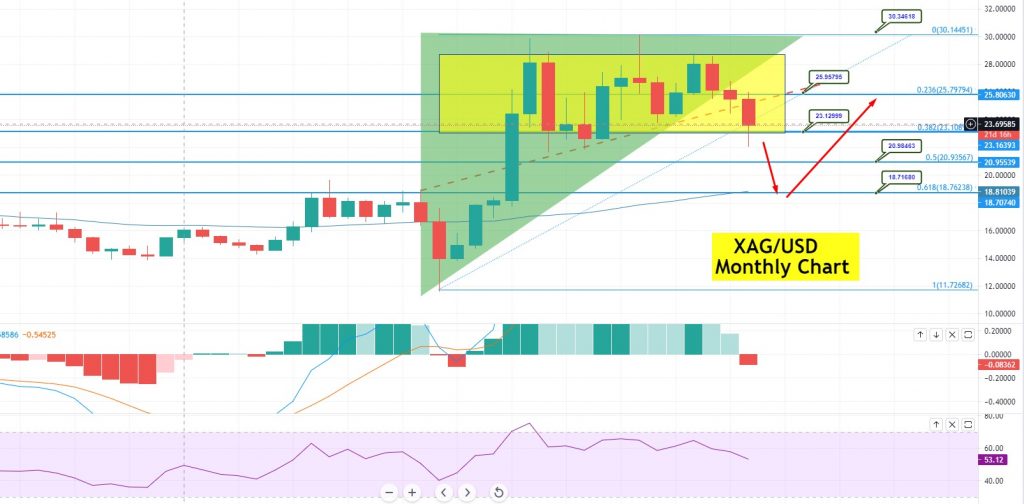
On the weekly chart, we see that the XAG/USD traded inside a range from 2014 until July 2020, despite the brief break in the middle of March last year, when everything crashed due to the coronavirus break out in Europe, before the big bullish reversal. So, that doesn’t count as a proper break. The price surged higher, getting pretty close to $ 30, which is another big round psychological barrier, but it reversed back down in August, although the previous resistance zone above $ 21 turned into support and has been holding since then. The 20 SMA caught up with the price towards the end of last year, pushing the price higher, but silver buyers couldn’t make new highs, and the price is returning back down. The failure to reach at least the previous high below $ 30 is a sign that buyers are not confident in keeping their positions close to that resistance zone and are not pushing for the trend to turn bullish on the weekly chart. So, now the sellers are in charge again.
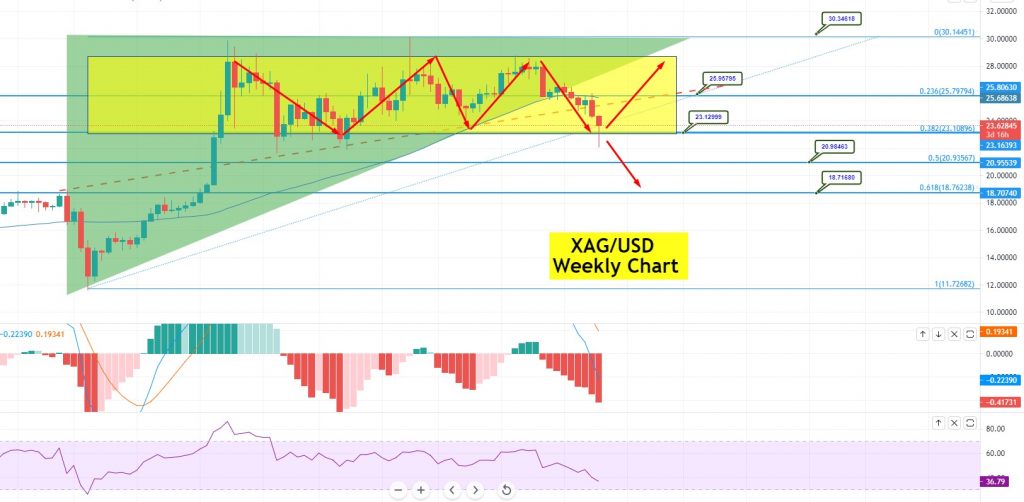
XAG/USD Weekly Chart
Recently, the safe-haven metal silver has plunged dramatically to complete 38.2% Fibonacci correction level on the weekly timeframe. This 38.2% Fibonacci retracement level of 23.10 is working as support now. As we can see on the chart above, the XAG/USD is closing a weekly candle with a massive shadow and a small body. This type of candlestick suggests weakness in selling bias. Thus the odds of XAG/USD breaking below the 23.12 level are weak. However, the 50 periods simple moving average is supporting a selling trend in silver and at the same time, it’s extending resistance at 25.95 area. A bearish breakout below 23 level can offer us a short opportunity to target 20.93 and 18.70 levels in the future.
